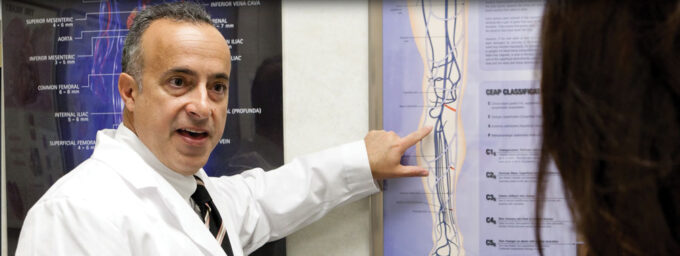Peripheral Artery Disease Treatment
Peripheral artery disease (PAD) is a serious vascular condition in which narrowed arteries reduce blood flow to the limbs. It is most common in the legs but can also affect the arms and kidneys. Over 150,000 amputations occur each year as a result of PAD and less than 50% of those patients have had any PAD screening.
Forty percent of patients with coronary artery disease also have PAD, and almost all patients with PAD have coronary artery disease. Unfortunately, PAD in the legs is often overlooked because leg pain is often considered a normal function of aging. In truth, it often indicates severe systemic atherosclerosis.
Symptoms of PAD include:
- Leg pain during exercise that subsides during rest
- Changes in skin color on the toes or feet
- Blood pressure in the legs and ankles that is different from that in the arm
- Pain, numbness or tingling in the legs
- Infections or sores that do not heal
The experienced cardiac specialists at Michigan Heart Group provide a full range of highly effective treatments for peripheral arterial disease. These include:
- Medication therapy and lifestyle changes – Keeping cholesterol and blood pressure at target levels, not smoking, and eating a healthy diet are all part of the plan. The drug cilostazol reduces symptoms of claudication in many people. We may also prescribe aspirin or other anticlotting drugs. The most effective treatment, however, is exercise. It may be surprising, but regular exercise reduces the pain of peripheral artery disease.
- Angioplasty/stenting (PTA) – This procedure is commonly used to open short sections of narrowed arteries in people who have peripheral arterial disease (PAD). How well PTA works depends on the size of the blood vessel, the length of blood vessel affected, and whether the blood vessel is completely blocked. In general larger arteries in the pelvic area can be treated successfully most of the time with angioplasty. After 4 to 5 years, the blood vessel remains open in 60% to 80% of cases. After 4 to 5 years, the artery may remain open in about 70% of cases. In most cases wire meshes or stents are place at the time of the PTA to improve long term patency of the vessel.
To schedule your appointment, call 248-267-5050 or request your appointment online.

